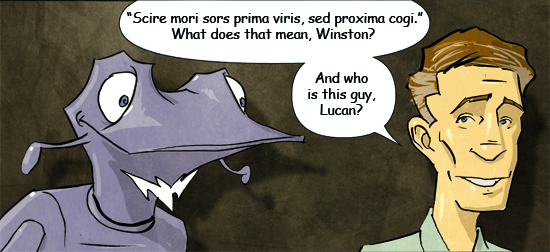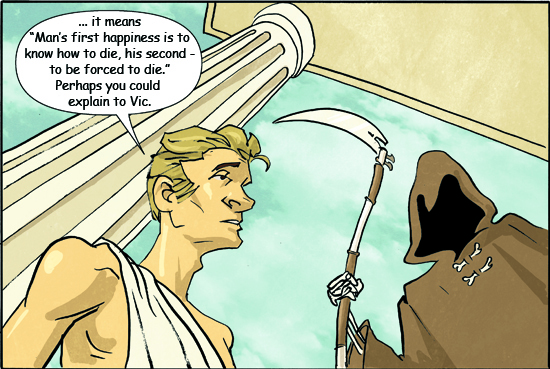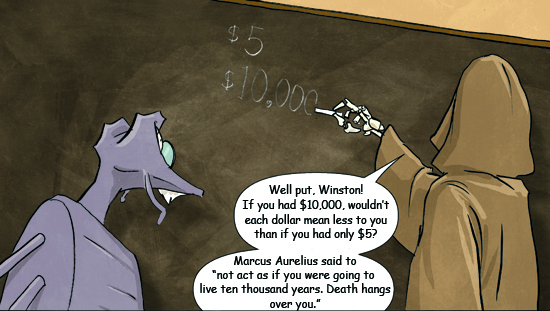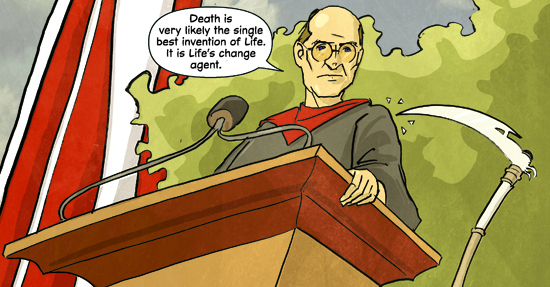Winston:Lucan was a Roman poet who lived 2,000 years ago. He was tutored by his uncle, Seneca, the famous Stoic philosopher. As for the quote...
Vic:Yes, perhaps you could, Winston! Why should death make me happy?
Winston:Lucan is saying that knowledge of our own mortality gives us the greatest motivation to value our lives.
Vic:I'm sensing a scientific study in my near future.
Winston:Ah, you know me too well. As a matter of fact, Professor Laura King, of the University of Missouri, and her colleagues gave students reminders of death.
Winston:And they started valuing life more.
Vic:Reminds me of this wristwatch I heard about last week. Tikker estimates how long you're going to live, then counts it down -- right in front of your eyes! Isn't that a little morbid?
Winston:Not necessarily. Imagine the ultimate quantified self device. A device that stimulates motivation to live a more purposeful life! Too often we just live as if we're going to be around forever. Result? Hours, days, even years, wasted --
Vic:Watching moronic beer commercials?
Winston:Precisely. With Tikker on your wrist, you might start giving greater value to the time you have on this earth.
Vic:You hear more and more about medical science extending our lifespan. Even talking about living hundreds of years --
Winston: To spend watching moronic beer commercials?
Vic:Maybe Lucan was onto something.
Winston:It's Economics 101, isn't it? Scarcity enhances value.
Winston:Like Lucan, a Stoic.
Vic:I always thought Stoics were boring and grumpy.
Winston:Au contraire my friend. Marcus Aurelius was one of ancient Rome's greatest emperors. Stoics would say goodbye to their friends as if it were the last time they'd see them. They'd even kiss their children goodnight, whispering to themselves that their child would never wake up.
Winston:Remember, Vic. I'm a dung beetle. I never joke. They found that this practice enhanced the love they had for their friends and children. So being "forced to die" may not be quite the curse that it seems. Death throws life into vivid contrast. It brings a sense of urgency to life ... inducing the urgency to change. After Marcus Aurelius said that "death hangs over you" he said "While you live, while it is in your power, be good."
Vic:It's like when Steve Jobs, at his 2005 commencement address to Stanford University graduates, talked about the motivation his own illness gave him. His motivation to "put a ding in the universe."
Winston:He was referring, of course, to having a strong purpose in his life.
Vic:So contemplating death, as morbid as that may seem, may stimulate a stronger purpose in our lives?
Winston:In another study, people asked to contemplate their death become more generous, more likely to donate blood.
Vic:This sure puts a new light on death.
Winston:As Elizabeth Kubler-Ross said: "If all of us would make an all-out effort to contemplate our own death, to deal with our anxieties surrounding the concept of our death, and to help others familiarize themselves with these thoughts, perhaps there could be less destructiveness around us."
Vic:Or, as Blue Öyster Cult sang, "Don't fear the reaper."
For more Winston, Vic, and the Grim Reaper, go to www.dungbeetle.org!
Our 2024 Coverage Needs You
It's Another Trump-Biden Showdown — And We Need Your Help
The Future Of Democracy Is At Stake
Our 2024 Coverage Needs You
Your Loyalty Means The World To Us
As Americans head to the polls in 2024, the very future of our country is at stake. At HuffPost, we believe that a free press is critical to creating well-informed voters. That's why our journalism is free for everyone, even though other newsrooms retreat behind expensive paywalls.
Our journalists will continue to cover the twists and turns during this historic presidential election. With your help, we'll bring you hard-hitting investigations, well-researched analysis and timely takes you can't find elsewhere. Reporting in this current political climate is a responsibility we do not take lightly, and we thank you for your support.
Contribute as little as $2 to keep our news free for all.
Can't afford to donate? Support HuffPost by creating a free account and log in while you read.
The 2024 election is heating up, and women's rights, health care, voting rights, and the very future of democracy are all at stake. Donald Trump will face Joe Biden in the most consequential vote of our time. And HuffPost will be there, covering every twist and turn. America's future hangs in the balance. Would you consider contributing to support our journalism and keep it free for all during this critical season?
HuffPost believes news should be accessible to everyone, regardless of their ability to pay for it. We rely on readers like you to help fund our work. Any contribution you can make — even as little as $2 — goes directly toward supporting the impactful journalism that we will continue to produce this year. Thank you for being part of our story.
Can't afford to donate? Support HuffPost by creating a free account and log in while you read.
It's official: Donald Trump will face Joe Biden this fall in the presidential election. As we face the most consequential presidential election of our time, HuffPost is committed to bringing you up-to-date, accurate news about the 2024 race. While other outlets have retreated behind paywalls, you can trust our news will stay free.
But we can't do it without your help. Reader funding is one of the key ways we support our newsroom. Would you consider making a donation to help fund our news during this critical time? Your contributions are vital to supporting a free press.
Contribute as little as $2 to keep our journalism free and accessible to all.
Can't afford to donate? Support HuffPost by creating a free account and log in while you read.
As Americans head to the polls in 2024, the very future of our country is at stake. At HuffPost, we believe that a free press is critical to creating well-informed voters. That's why our journalism is free for everyone, even though other newsrooms retreat behind expensive paywalls.
Our journalists will continue to cover the twists and turns during this historic presidential election. With your help, we'll bring you hard-hitting investigations, well-researched analysis and timely takes you can't find elsewhere. Reporting in this current political climate is a responsibility we do not take lightly, and we thank you for your support.
Contribute as little as $2 to keep our news free for all.
Can't afford to donate? Support HuffPost by creating a free account and log in while you read.
Dear HuffPost Reader
Thank you for your past contribution to HuffPost. We are sincerely grateful for readers like you who help us ensure that we can keep our journalism free for everyone.
The stakes are high this year, and our 2024 coverage could use continued support. Would you consider becoming a regular HuffPost contributor?
Dear HuffPost Reader
Thank you for your past contribution to HuffPost. We are sincerely grateful for readers like you who help us ensure that we can keep our journalism free for everyone.
The stakes are high this year, and our 2024 coverage could use continued support. If circumstances have changed since you last contributed, we hope you'll consider contributing to HuffPost once more.
Already contributed? Log in to hide these messages.



